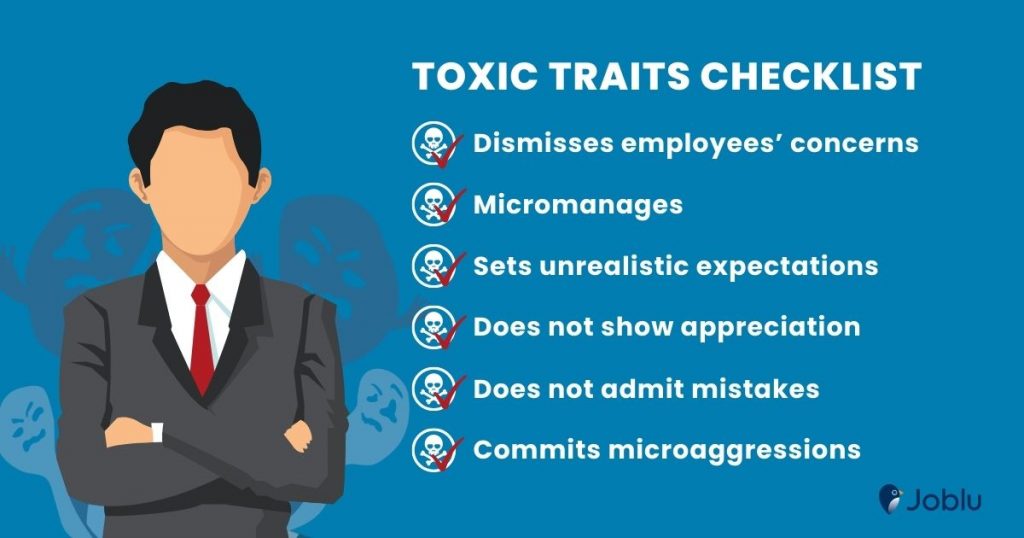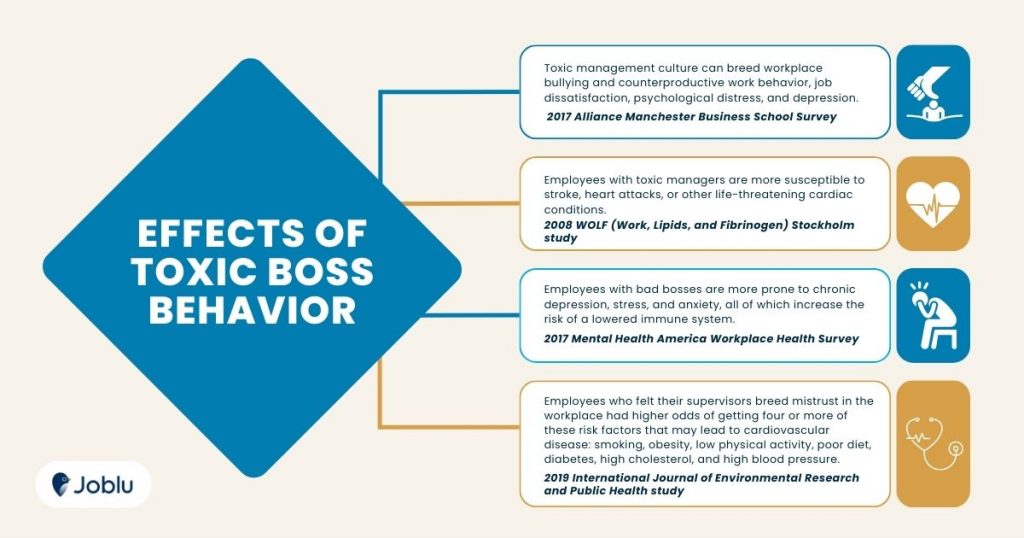Are you currently experiencing mass resignations in your company? Perhaps it’s time to check if toxic manager traits are driving your talents away.
The common corporate adage goes: “People leave managers, not companies.” Various studies and surveys over the years have noted how many people led by toxic managers quit or consider quitting. In the cases where employees don’t actually quit in the literal sense, many of them resort to quiet quitting.
Not quite sure if you’re fostering a toxic management culture in your workplace? In this blog, you’ll learn all about how to immediately recognize a toxic manager and how their behavior may adversely affect your worker. You’ll also get pointers on how to impede toxic manager behaviors or traits proactively.
Table of Contents
How to Spot Toxic Management: Toxic Manager Checklist

How can you tell apart a manager with poor leadership skills and a manager with toxic behaviors? Here are some signs of a toxic manager in the workplace:
Dismisses employees’ concerns
This stems from a lack of empathy. A toxic manager will ignore employees who raise their questions and concerns. At worst, they can even gaslight these employees.
Micromanages
While not all micromanagers are inherently toxic, they can become toxic when they exercise too much control over every employee. Their micromanagement can hamper a team’s growth, especially when they fail to coach or provide feedback.
Sets unrealistic expectations
An extension of micromanagement tendencies, a toxic manager will have close to impossible expectations of their team and will do anything to achieve them. They may use manipulation, intimidation, and other scare tactics instead of motivation to produce results.
Does not show appreciation
A toxic manager’s lack of empathy affects their communication skills, including their ability to acknowledge an employee. At worst, a toxic manager will even take credit for the good work.
Does not admit mistakes
Owing to their poor communication skills, a toxic manager does not have the ability to own up to their mistakes. Some of the most toxic leaders even end up blaming employees for bad results or mishaps.
Commits microaggressions
Microaggressions are tiny acts and remarks that can occur day-to-day. Such microaggressions come in the form of unfunny jokes that make everyone uncomfortable. They make such jokes to victim-blame, make sexist or racist remarks, or put forth unwanted sexual innuendos or harassment behaviors.
Effects of Toxic Boss Behavior

The effects of toxic management culture aren’t just limited to employees. A 2017 survey done at Alliance Manchester Business School reveals that such toxic leadership can be detrimental to the whole organization. “As the levels of psychopathy and narcissism increased among leaders, so too did the prevalence of workplace bullying, counterproductive work behavior, job dissatisfaction, psychological distress and depression among subordinate employees,” Abigail Phillips, PhD researcher in organizational psychology notes in the report.
On the individual level, the effects of toxic management culture can result in poor health and diseases. A Swedish study connects toxic manager behavior to an employee’s susceptibility to stroke, heart attacks, and other life-threatening cardiac diseases.
A workplace study by Mental Health America shows that employees with toxic bosses are much more prone to developing chronic depression, stress, and anxiety. These make them more vulnerable to more serious conditions with their weakened immune system.
A study published in the International Journal of Environmental Research and Public Health went even more specific. In the study, the researchers have found employees sensitive to the mistrust bred by supervisors in the workplace “had higher odds of getting four or more of the LS7 cardiovascular disease (CVD) risk factors.” LS7 refers to the American Heart Association Life’s Simple 7 (LS7)): smoking, obesity, low physical activity, poor diet, diabetes, high cholesterol, and high blood pressure.
How to Avoid Toxic Management Culture
Got a toxic manager in your midst? Fear that you may be one? Curb toxic manager traits before they start spreading like wildfire in your office, poisoning the morale of your entire team in the process. Here are some ways to clean up your act:
1. Communicate respectfully, openly, and proactively
A toxic manager, at the very root, is a bad communicator. Practice good communication skills by proactively acknowledging your team’s contributions, listening to their concerns, and providing constructive feedback. Above all, practice empathy. Put yourself in your employee’s shoes and discern how you’d like to be treated.
2. Be invested in your team’s development
Employers that truly care for their employees invest in their professional growth. Show this type of investment by trusting your employees to do their jobs well. Encourage them to take risks but support them with feedback when they make mistakes or fail.
3. Acknowledge and learn from your own mistakes
A good manager isn’t necessarily expected to be perfect. Employees will appreciate it if you would own up to your own mistakes and miscalculations and learn from them.
4. Avoid getting personal
Caring about your job doesn’t mean taking it too personally. Exercise healthy boundaries at work, especially when the pressure is on.
5. Keep your behavior in check
If you’ve practiced toxic manager behaviors unchecked, it can be hard to undo the habit. Always be on your toes, and allow people to call you out on your behavior.
It’s easy to succumb to toxic behavior in the workplace especially when work gets stressful. However, allowing bad or dysfunctional leadership to thrive in your organization will not only destroy your team – it can effectively ruin people’s health and lives.
If you see signs of a toxic manager within yourself or within your team, take the time to reflect on them and find out what causes you or your management personnel to act in such a way. Unlearning toxic manager traits takes time, but as long as you’re willing to learn (and unlearn), you can drive your team to success while becoming a better manager yourself.
Discover rock stars who are a perfect fit in your company culture, including ones with leadership potential. Sign up for Joblu and link with talented individuals from across the globe.
Frequently Asked Questions about Toxic Manager Behavior
Q: What is a toxic management style?
A: A toxic management style is a leadership style that can have ill effects on an individual employee and an entire team or organization. These Ill effects include vulnerability to many life-threatening diseases and mental health conditions such as chronic depression and anxiety. Toxic leadership can also effectively ruin the productivity of a team and at worst, breed mistrust and workplace bullying.
Q: What is an example of an unprofessional manager?
A: An example of an unprofessional manager is a leader who does not know how to regulate their emotions and practice healthy boundaries. These characteristics can come out in various ways. They can verbally or physically abuse employees, commit microaggressions, or use their power to make things worse for the employee at work.
Q: What is a common weakness for a leader?
A common weakness for a leader is having bad communication skills. An effective leader doesn’t have to be the smartest in a group – they simply have to communicate professionally and empathically.
Q: How do you know if you have a toxic manager?
A: You know you have a toxic manager in the workplace if you see a team with remarkably low morale and productivity and a high attrition rate.
Q: Why do companies keep toxic managers?
A: Some companies keep toxic managers because some toxic leaders actually perform using their less-than-professional ways (manipulation and fear-mongering among employees). More often than not, companies sacrifice their team’s well-being to a toxic manager because firing and hiring a manager can be quite costly.